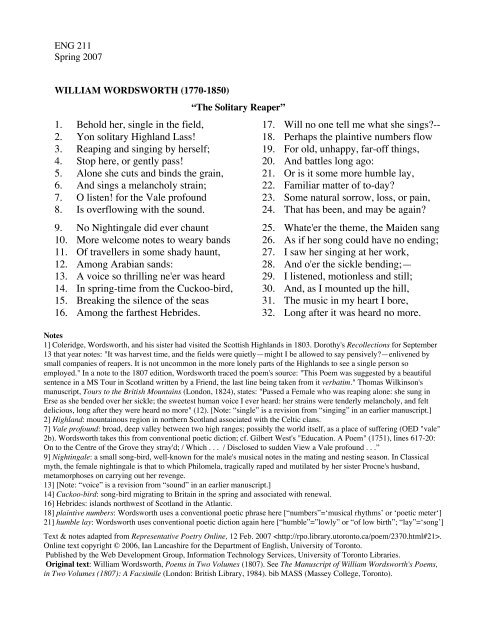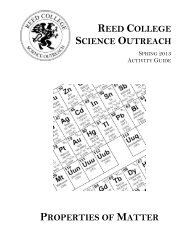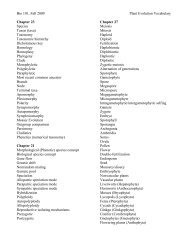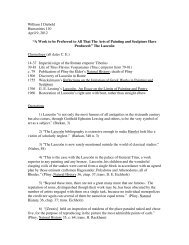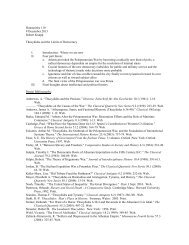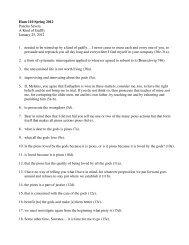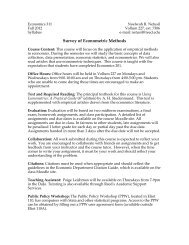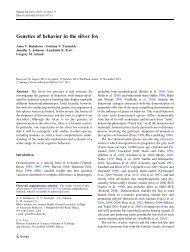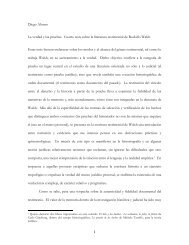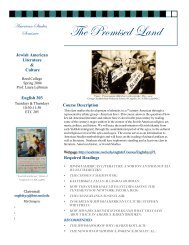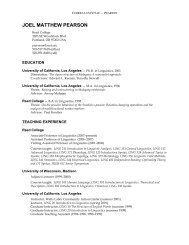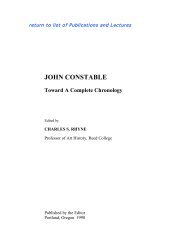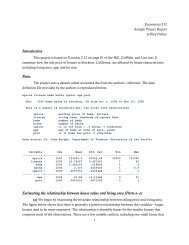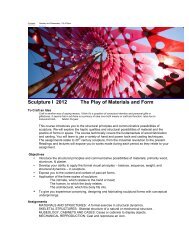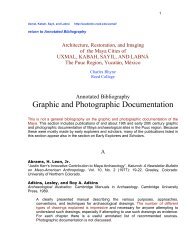The Solitary Reaper - Reed College
The Solitary Reaper - Reed College
The Solitary Reaper - Reed College
Create successful ePaper yourself
Turn your PDF publications into a flip-book with our unique Google optimized e-Paper software.
ENG 211<br />
Spring 2007<br />
WILLIAM WORDSWORTH (1770-1850)<br />
1. Behold her, single in the field,<br />
2. Yon solitary Highland Lass!<br />
3. Reaping and singing by herself;<br />
4. Stop here, or gently pass!<br />
5. Alone she cuts and binds the grain,<br />
6. And sings a melancholy strain;<br />
7. O listen! for the Vale profound<br />
8. Is overflowing with the sound.<br />
9. No Nightingale did ever chaunt<br />
10. More welcome notes to weary bands<br />
11. Of travellers in some shady haunt,<br />
12. Among Arabian sands:<br />
13. A voice so thrilling ne'er was heard<br />
14. In spring-time from the Cuckoo-bird,<br />
15. Breaking the silence of the seas<br />
16. Among the farthest Hebrides.<br />
“<strong>The</strong> <strong>Solitary</strong> <strong>Reaper</strong>”<br />
17. Will no one tell me what she sings?--<br />
18. Perhaps the plaintive numbers flow<br />
19. For old, unhappy, far-off things,<br />
20. And battles long ago:<br />
21. Or is it some more humble lay,<br />
22. Familiar matter of to-day?<br />
23. Some natural sorrow, loss, or pain,<br />
24. That has been, and may be again?<br />
25. Whate'er the theme, the Maiden sang<br />
26. As if her song could have no ending;<br />
27. I saw her singing at her work,<br />
28. And o'er the sickle bending;—<br />
29. I listened, motionless and still;<br />
30. And, as I mounted up the hill,<br />
31. <strong>The</strong> music in my heart I bore,<br />
32. Long after it was heard no more.<br />
Notes<br />
1] Coleridge, Wordsworth, and his sister had visited the Scottish Highlands in 1803. Dorothy's Recollections for September<br />
13 that year notes: "It was harvest time, and the fields were quietly—might I be allowed to say pensively?—enlivened by<br />
small companies of reapers. It is not uncommon in the more lonely parts of the Highlands to see a single person so<br />
employed." In a note to the 1807 edition, Wordsworth traced the poem's source: "This Poem was suggested by a beautiful<br />
sentence in a MS Tour in Scotland written by a Friend, the last line being taken from it verbatim." Thomas Wilkinson's<br />
manuscript, Tours to the British Mountains (London, 1824), states: "Passed a Female who was reaping alone: she sung in<br />
Erse as she bended over her sickle; the sweetest human voice I ever heard: her strains were tenderly melancholy, and felt<br />
delicious, long after they were heard no more" (12). [Note: “single” is a revision from “singing” in an earlier manuscript.]<br />
2] Highland: mountainous region in northern Scotland associated with the Celtic clans.<br />
7] Vale profound: broad, deep valley between two high ranges; possibly the world itself, as a place of suffering (OED "vale"<br />
2b). Wordsworth takes this from conventional poetic diction; cf. Gilbert West's "Education. A Poem" (1751), lines 617-20:<br />
On to the Centre of the Grove they stray'd; / Which . . . / Disclosed to sudden View a Vale profound . . .”<br />
9] Nightingale: a small song-bird, well-known for the male's musical notes in the mating and nesting season. In Classical<br />
myth, the female nightingale is that to which Philomela, tragically raped and mutilated by her sister Procne's husband,<br />
metamorphoses on carrying out her revenge.<br />
13] [Note: “voice” is a revision from “sound” in an earlier manuscript.]<br />
14] Cuckoo-bird: song-bird migrating to Britain in the spring and associated with renewal.<br />
16] Hebrides: islands northwest of Scotland in the Atlantic.<br />
18] plaintive numbers: Wordsworth uses a conventional poetic phrase here [“numbers”=‘musical rhythms’ or ‘poetic meter‘]<br />
21] humble lay: Wordsworth uses conventional poetic diction again here [“humble”=”lowly” or “of low birth”; “lay”=‘song’]<br />
Text & notes adapted from Representative Poetry Online, 12 Feb. 2007 .<br />
Online text copyright © 2006, Ian Lancashire for the Department of English, University of Toronto.<br />
Published by the Web Development Group, Information Technology Services, University of Toronto Libraries.<br />
Original text: William Wordsworth, Poems in Two Volumes (1807). See <strong>The</strong> Manuscript of William Wordsworth's Poems,<br />
in Two Volumes (1807): A Facsimile (London: British Library, 1984). bib MASS (Massey <strong>College</strong>, Toronto).
First publication date: 1807 / RPO poem editor: Ian Lancashire, J. R. MacGillivray / RP edition: 3RP 2.386.<br />
Recent editing: 2:2002/3/20*1:2002/9/9*1:2002/11/7*1:2006/3/3 Composition date: 5 November 1805<br />
Rhyme: ababccdd or abcbddee<br />
Commentary by Ian Lancashire (2002/9/9)<br />
Wordsworth's preface to the 1800 Lyrical Ballads argues that poetry "contains a natural delineation of human passions,<br />
human characters, and human incidents." It ought not be judged by the presence of artificial, poetic diction. Rather, "the<br />
language of conversation in the middle and lower classes of society" can be its medium. "<strong>The</strong> <strong>Solitary</strong> <strong>Reaper</strong>" exemplifies<br />
these beliefs.<br />
Written seven years after Lyrical Ballads, it describes a nameless listener's delight in a young woman's melancholy song<br />
in an unknown language as, working by herself in a Scottish valley, she swings a sickle, reaping grain. Four eight-line<br />
stanzas, each closing with two couplets and all written in octosyllabic lines, have a musical lilt. Short lines deliver the rhymes<br />
at a quick pace. Sentences normally need two or more such short lines to complete, so that few lines are strongly endstopped;<br />
most freely enjamb. Diction is conversational. Often lines consist mainly of monosyllabic words (4-5, 13, 17, 21,<br />
24, 27, 30-32). Wordsworth prefers common verbs, "behold," "reap," "sing," "stop," "pass," "cut," "bind," "chant," "hear,"<br />
and "break." Words imported into English from Latin or Greek, like "solitary" and "melancholy" or forms with "-ive" and "ion"<br />
endings (e.g., "plaintive" and "motionless"), are infrequent.<br />
Wordsworth writes plain, almost undemanding verse. For example, he repeats the simplest idea in varying words. <strong>The</strong><br />
girl is "single," "solitary," and "by herself" (1-3). She is "reaping" (3), that is, "cuts and binds the grain" (5), "o'er the sickle<br />
bending" (28). <strong>The</strong> onlooker is both "motionless and still" (29). <strong>The</strong> lass "sings" (3, 17, 25, 27) or does "chant" (9) a "strain"<br />
(6), a "lay" (21), or "a song" (26). <strong>The</strong> speaker relies on everyday idioms, worn to vagueness by overuse in ordinary talk. Her<br />
"theme" (25) is of "things" (19) or "matter" (22) "That has been, and may be again" (24). This excludes only what never<br />
existed at all. Whenever the speaker might become elevated in speech, his language seems prosaic, even chatty: "Will no one<br />
tell me ..." (17), "Whate're the theme" (25), and "Long after it was heard no more" (32). Wordsworth notes, pointedly, that<br />
this last line comes verbatim from a prose travel book.<br />
"<strong>The</strong> <strong>Solitary</strong> <strong>Reaper</strong>" does not implement, programmatically, his dogma of plain diction. For example, "Vale profound"<br />
(7), "plaintive numbers" (18), and "humble lay" (21) are semi-formulaic catch phrases in the very eighteenth-century verse<br />
whose artificiality he rejects. <strong>The</strong>se exceptions may be deliberate, characterizing the speaker (not Wordsworth) as someone<br />
for whom poetry means much. He resorts to formulas as if to hint that the girl's song is out-of-place in the valley, however<br />
separated from the traditions of fine verse by her class, occupation, and location. Wordsworth may deliberately impoverish<br />
his speaker's language so as to contrast it with the reaper's song.<br />
Unlike other poets, this lass sings alone, isolated from both her predecessors (her "poetic tradition") and any audience.<br />
Dryden, Pope, Gray, and so many others defined themselves by quoting from classical literature and each other.<br />
Wordsworth's "<strong>The</strong> <strong>Solitary</strong> <strong>Reaper</strong>" shatters this continuity. Her song, like a found poem, springs directly from nature,<br />
without literary context. Her "music" runs like water ("overflowing" the valley) and surpasses the beauty of two celebrated<br />
English song-birds, the nightingale and the cuckoo. Here again the speaker raids conventional poetic language, as if incapable<br />
of finding truly suitable language. Ironically, both his analogies break down. Reaping takes place at harvest time, in the<br />
autumn, not in the spring or summer, seasons traditionally associated with the cuckoo and the nightingale. <strong>The</strong> reaper, a<br />
single "Maiden" (25), hardly fits the myth of married Philomela, rape victim and tragic revenger, even though the reaper<br />
sings in a melancholic, plaintive way about "Some natural sorrow" (23). <strong>The</strong> strange language in which the lass chants also<br />
removes her from any poetic tradition known to the speaker. He comprehends only her "sound," "voice," and "music," though<br />
it rings in his heart -- his memory -- "long after it was heard no more" (32).<br />
This simple confession redeems the speaker from his own impoverished language. He bears witness to something that<br />
eighteenth-century poetry seemed at times embarrassed of. What transfixes him in song is not its content, but its emotionally<br />
expressive music. <strong>The</strong> listener does not understand why she sings in melancholy, only what the emotion itself is. This feeling<br />
"could have no ending" (26), as if she, like Keats' Ruth amid the alien corn, communicates wordlessly something universal<br />
about the human condition. Despite its sadness, the song helps the speaker to mount up the hill (30). In current psychology,<br />
the capacity to feel emotion and link it to goals makes life, indeed survival itself, possible. <strong>The</strong> speaker's "heart" (31), by<br />
bearing her music, can go on. For that reason, "<strong>The</strong> <strong>Solitary</strong> <strong>Reaper</strong>" relates an ecstatic moment in which a passer-by<br />
transcends the limitations of mortality. Both the song and he go on together.<br />
Bibliography<br />
Finch, Geoffrey J. "Wordsworth's <strong>Solitary</strong> Song: <strong>The</strong> Substance of 'true art' in '<strong>The</strong> <strong>Solitary</strong> <strong>Reaper</strong>'." Ariel 6.3 (1975): 91-100. PR/1/A75<br />
Howard, William. "'Obstinate questionings': <strong>The</strong> Reciprocity of Speaker and Auditor in Wordsworth's Poetry." Philological Quarterly 67.2<br />
(Spring 1988): 219-39.<br />
James, G. Ingli, and Pittock, Malcolm. "Wordsworth's '<strong>The</strong> <strong>Solitary</strong> <strong>Reaper</strong>'." Essays in Criticism 15 (1965: 65-76. PN/2/E77<br />
Jones, Nancy A. "<strong>The</strong> Rape of the Rural Muse: Wordsworth's '<strong>The</strong> <strong>Solitary</strong> <strong>Reaper</strong>' as a Version of Pastourelle." In Higgins, Lynn A., and<br />
Silver, Brenda R., eds. Rape and Representation (New York: Columbia University Press, 1991): 263-77. PN 56 .R24R37 1991<br />
McSweeney, Kerry. "Performing '<strong>The</strong> <strong>Solitary</strong> <strong>Reaper</strong>' and 'Tears, Idle Tears.'" Criticism: A Quarterly for Literature and the Arts 38:2<br />
(Spring 1996): 281-302.<br />
Preston, John. "'<strong>The</strong> Moral Properties and Scope of Things': <strong>The</strong> Structure of <strong>The</strong> <strong>Solitary</strong> <strong>Reaper</strong>." Essays in Criticism 19 (1969): 60-66.


